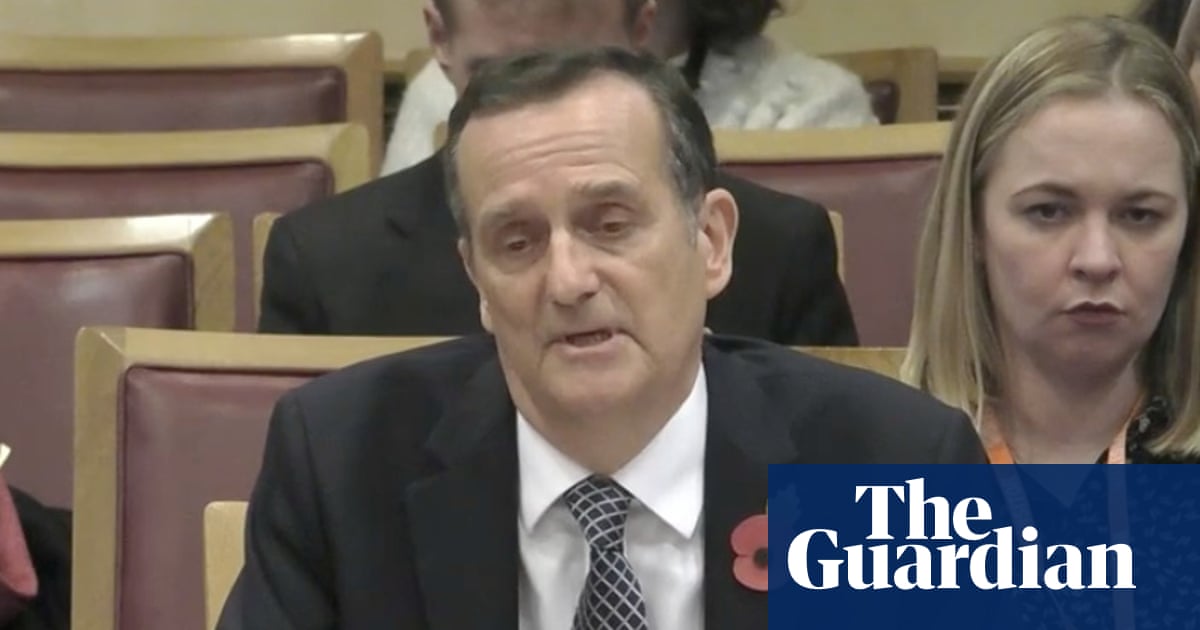Imagine the furore if a Guardian columnist suggested bombing, say, the Conservative party conference and the Tory stronghold of Arundel in Sussex. It would dominate public discussion for weeks. Despite protesting they were “only joking”, that person would never work in journalism again. Their editor would certainly be sacked. The police would probably come knocking. But when the Spectator columnist Rod Liddle speculates about bombing Glastonbury festival and Brighton, complaints are met with, “Calm down dear, can’t you take a joke?” The journalist keeps his job, as does his editor, the former justice secretary Michael Gove. There’s one rule for the left and another for the right.
The same applies to the recent comments on GB News by its regular guest Lewis Schaffer. He proposed that, to reduce the number of disabled people claiming benefits, he would “just starve them. I mean, that’s what people have to do, that’s what you’ve got to do to people, you just can’t give people money … What else can you do? Shoot them? I mean, I suggest that, but I think that’s maybe a bit strong.” The presenter, Patrick Christys replied, “Yeah, it’s just not allowed these days.”
You could call these jokes, if you think killing people is funny. Or you could call them thought experiments. Liddle suggested as much in his column: “I am merely hypothesising, in a slightly wistful kinda way.” This “humour” permits obscene ideas to seep into the range of the possible.
Academic researchers see the use of jokes to break taboos and reduce the thresholds of hate speech as a form of “strategic mainstreaming”. Far-right influencers use humour, irony and memes to inject ideas into public life that would otherwise be unacceptable. In doing so, they desensitise their audience and normalise extremism. A study of German Telegram channels found that far-right content presented seriously achieved limited reach, as did non-political humour. But when far-right extremism was presented humorously, it took off.
Humour offers deniability. In his article on 3 July, after floating the possibility of killing hundreds of thousands of people, Liddle remarked: “I am not saying that we should do this, of course – it would be a horrible, psychopathic thing to do.” You can scarcely miss the wink. Such speculations have anchored misogyny, homophobia and racism for decades: “Lost your sense of humour, love?” – wink, wink. They distance the writer from the intention, and provide moral cover for the owners of the platform (the hedge fund hectomillionaire and evangelical Christian Paul Marshall is both the owner of the Spectator and the co-owner of GB News). Perhaps we could call it wink murder.
When people become desensitised by ironic calls for violence, the difference between a humorous position and an ideological conviction can begin to break down. They are said by some researchers to suffer from “irony poisoning”. If, for example, people are repeatedly exposed to racial stereotypes in “humorous” form, they are likely to lose perspective, and start to absorb and affirm them. The results are anything but amusing.
Before launching his terror attack in Christchurch, New Zealand, the white supremacist Brenton Tarrant announced his intention with a “humorous” meme on the forum 8chan. The same phrase was painted on his rifle. After the attack, in which he murdered 51 people, far-right influencers made a joke of it, creating, among other grim amusements, a playable Roblox version of the mass shooting.
It is striking how often those who jokingly advocate dehumanisation and violence appear to act on these impulses. Liddle accepted a police caution for allegedly assaulting his pregnant girlfriend (which he later denied). Jeremy Clarkson proposed that Meghan, the Duchess of Sussex, should be “made to parade naked through the streets of every town in Britain while crowds chant, ‘Shame!’ and throw lumps of excrement at her”. He said of striking public sector workers, “I’d have them all shot. I would take them outside and execute them in front of their families.” In real life, he launched an unprovoked assault on his producer.
Perhaps, if strikers had never been shot, concerts – and, for that matter, Brighton – had never been bombed, disabled people had never been starved or shot and women had never been humiliated and attacked in public places, such incitement might be less of a problem. But all these things have happened, and all are more likely to happen when the threshold of acceptability is lowered through irony and humour.
As foreign secretary, Boris Johnson joked about UK investors turning the Libyan city of Sirte into a new Dubai: “The only thing they’ve got to do is clear the dead bodies away and then they’ll be there.” When he became prime minister, he appeared to put his dehumanising rhetoric into action. Diary entries by the former chief scientific adviser Sir Patrick Vallance claim Johnson endorsed the idea that Covid was “nature’s way of dealing with old people”. They should accept their fate, “letting the young get on with life and [keep] the economy going”. The Covid inquiry was told that Johnson asked, “Why are we destroying the economy for people who will die anyway soon?” Several insiders claim (though he has denied it) that he said “no more fucking lockdowns – let the bodies pile high in their thousands”. Partly as a result of his psychopathic levels of insouciance and neglect, more than 200,000 UK citizens died of the disease. We chortle along, then discover they mean it.
“Funny” memes such as Pepe the Frog and Doge, while originally used innocuously, became vehicles to deny and sanitise Nazi atrocities. Anyone who objected was told to “lighten up” or “get a sense of humour”. Then we watched as the president of the United States adopted the frog meme and his sidekick Elon Musk named his massive assault on federal spending after the Doge meme. I’m sure they both found it hilarious.
Dominant powers have for centuries used clowns to express their deepest, most unmentionable urges. Humorous suggestions of violence reveal and embolden real desires. The likes of Liddle and Schaffer are presented as outliers to be laughed off, or, if they cause too much trouble for their bosses, lightly reprimanded. But in some respects they deliver a closer representation of establishment truths than any sober editorial. They probe our defences. They soften us up for violence and misrule. They are not an anomaly. They are an embodiment. It’s the clowning that kills us.
-
George Monbiot is a Guardian columnist
-
On Tuesday 16 September, join George Monbiot and guests as they discuss the forces driving climate denialism, live at the Barbican in London and livestreamed globally. Book tickets here or at Guardian.Live

 3 months ago
49
3 months ago
49

















































